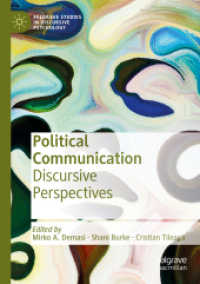- ホーム
- > 洋書
- > 英文書
- > Politics / International Relations
Full Description
The continued spread of democracy into the twenty-first century has seen two-thirds of the almost two hundred independent countries of the world adopting this model. In these newer democracies, one of the biggest challenges has been to establish the proper balance between the civilian and military sectors. A fundamental question of power must be addressed-who guards the guardians and how?
In this volume of essays, contributors associated with the Center for Civil-Military Relations in Monterey, California, offer firsthand observations about civil-military relations in a broad range of regions including Latin America, Africa, Asia, and Eastern Europe. Despite diversity among the consolidating democracies of the world, their civil-military problems and solutions are similar-soldiers and statesmen must achieve a deeper understanding of one another, and be motivated to interact in a mutually beneficial way. The unifying theme of this collection is the creation and development of the institutions whereby democratically elected civilians achieve and exercise power over those who hold a monopoly on the use of force within a society, while ensuring that the state has sufficient and qualified armed forces to defend itself against internal and external aggressors. Although these essays address a wide variety of institutions and situations, they each stress a necessity for balance between democratic civilian control and military effectiveness.
Contents
Foreword (David Pion-Berlin)
Acknowledgments
Introduction (Thomas C. Bruneau)
Part One: Actors and Institutions
Chapter 1. Military Professionalism in a Democracy (Thomas-Durell Young)
Chapter 2. Legislatures and National Defense: Global Comparisons (Jeanne Kinney Giraldo)
Chapter 3. Ministries of Defense and Democratic Control (Thomas C. Bruneau and Richard B. Goetze Jr.)
Part Two: Roles and Missions of the Military
Chapter 4. Strategy Formulation and National Defense: Peace, War, and the Past as Prologue (Douglas Porch)
Chapter 5. The Spectrum of Roles and Missions of the Armed Forces (Paul Shemella)
Part Three: Issues in Civilian Control of the Military
Chapter 6. Reforming Intelligence: The Challenge of Control in New Democracies (Thomas C. Bruneau and Kenneth R. Dombroski)
Chapter 7. Defense Budgets, Democratic Civilian Control, and Effective Governance (Jeanne Kinney Giraldo)
Chapter 8. Conscription or the All-Volunteer Force: Recruitment in a Democratic Society (Edwin R. Micewski)
Chapter 9. Professional Military Education in Democracies (Karen Guttieri)
Conclusion (Thomas C. Bruneau and Scott D. Tollefson)
About the Editors and Contributors
Notes
Bibliography
Index







